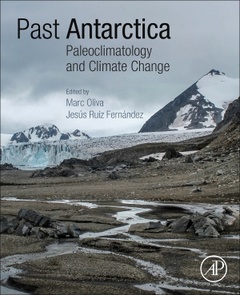Past Antarctica Paleoclimatology and Climate Change
Coordonnateurs : Oliva Marc, Ruiz Fernandez Jesus

Past Antarctica: Paleoclimatology and Climate Change presents research on the past and present of Antarctica in reference to its current condition, including considerations for effects due to climate change. Experts in the field explore key topics, including environmental changes, human colonization and present environmental trends. Addressing a wide range of fields, including the biosphere, geology and biochemistry, the book offers geographers, climatologists and other Earth scientists a vital resource that is beneficial to an understanding of Antarctica, its history and conservation efforts.
Part 1. Reconstructing Past Climate Variability 1. Long-Term Climate Evolution Based on Ice Core Records 2. Inferring the Past Atmospheric Composition from Ice Cores 3. Holocene Environmental Changes Deduced from Antarctic Lake Sediments
Part 2. Geological and Geomorphological Dynamics 4. The role of volcanism in the making of Antarctica 5. Tracing Deglaciation Since the Last Glacial Maximum 6. Glacio-isostatic Uplift and Relative Sea Level Changes 7. Past Geomorphic Processes: The role of Periglacial Processes in Ice-Free Environments 8. Soils of Antarctica: A Key to Past Environments
Part 3. Biological Processes and Human Colonization 9. Past Changes on Fauna and Flora Distribution 10. Refuge of Antarctic Biodiversity 11. Geoecological Response
Part 4. Recent Climate and Environmental Trends 12. Connections with Middle and Low Latitudes 13. Recent Climate Trends 14. Exploring and Exploiting Antarctica: The First Human Interactions 15. Humans in Antarctica: Science and Policy
Earth Scientists including climatologists, geographers, geomorphologists, workers in paleoenvironments, global and planetary change and the physical geography of Antarctica
Jesús Ruiz-Fernández is Assistant Professor at the University of Oviedo (Spain). His research experience includes over a decade of participation in various projects of national and international research; his current research activity is mainly focused on the quaternary and present-day environmental evolution of polar regions (Antarctica, Greenland) and mountain areas, as well as the study of natural hazards (mainly large snowfalls and snow avalanches). He has participated in the organization of scientific conferences and meetings, coordinated conference cycles, and conducted several research internship in universities and national and foreign centers. Dr. Ruiz-Fernández is a member of the Spanish Society of Geomorphology, the Spanish Association of Geography, the Permafrost Young Researchers Network (PYRN), and a corresponding member of the Royal Institute of Asturian Studies (RIDEA).
- Synthesizes research on the past and present of Antarctica, bringing together top Earth scientists who work in this discipline
- Presents the most complete reconstruction of the paleoclimate and environment of Antarctica, tying in long-term climatic changes to the current environment
- Offers perspectives from different branches of the Earth Sciences using a spatial-temporal lens
Date de parution : 06-2020
Ouvrage de 326 p.
19x23.3 cm
Thème de Past Antarctica :
Mots-clés :
Abrupt changes; Air bubbles in ice; Antarctic Ice Sheet; Antarctic Treaty System; Antarctic tundra; Antarctica; Archaeology; Arrhenius prediction; Biodiversity; Biogeography; Carbon dioxide record; Climate change; Climatic changes; Conservation; Continental breakup; Deglaciation; Ecological responses; Ecosystem sensitivity; El Niño-Southern Oscillation; Environmental protection; Exploration; Fauna; Flood basalts; Flora; Fossils; Future of Antarctica; Gelisols; Genetic divergence; Geomorphological processes; Glacial cycles; Glacial refugia; Glacial/interglacial variability; Glacial-interglacial cycles; Glaciation; Glacio-isostatic adjustment; Gondwana; History; Human impacts; Ice age; Ice core record of greenhouse gases; Ice cores; Ice sheet dynamics; Ice-free surfaces; Imperialism; Interglacial periods; International cooperation; International Polar Years; Isolation; Isolation lakes; Lake sedimentary records; Large igneous province; Mass extinction; Mesozoic; Paleoclimate; Paleo-climate forcing; Paleoenvironmental evolution; Paleosols; Palynological record; Paraglacial; Pedology; Periglacial; Permafrost; Pleistocene; Pressure; Raised beaches; Refugia; Relative sea level changes; SCAR; Science policy; Sea ice; Slab window; Soil chronosequences; Southern Annular Mode; Subduction; Survival of life; Teleconnections; Temperature; Temperature reconstructions; Terrestrial biodiversity; Terrestrial ecosystems; The last deglaciation; Water stable isotopes; West Antarctic Rift System
